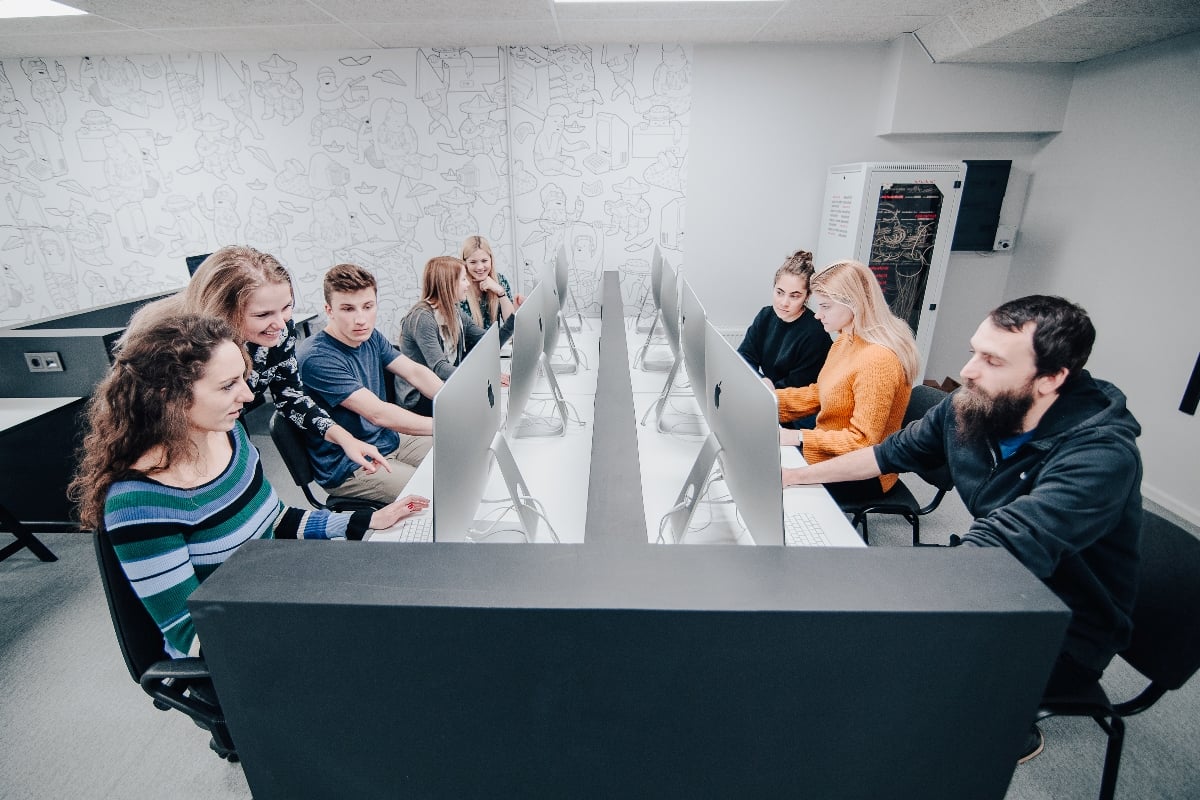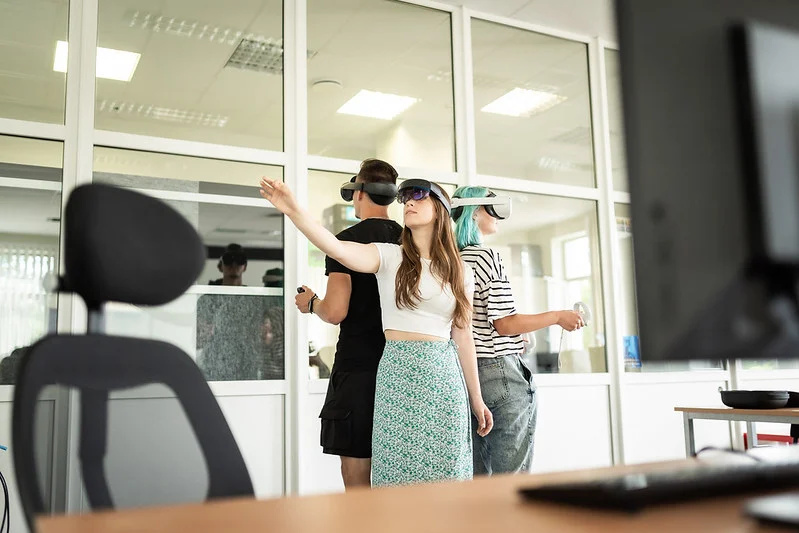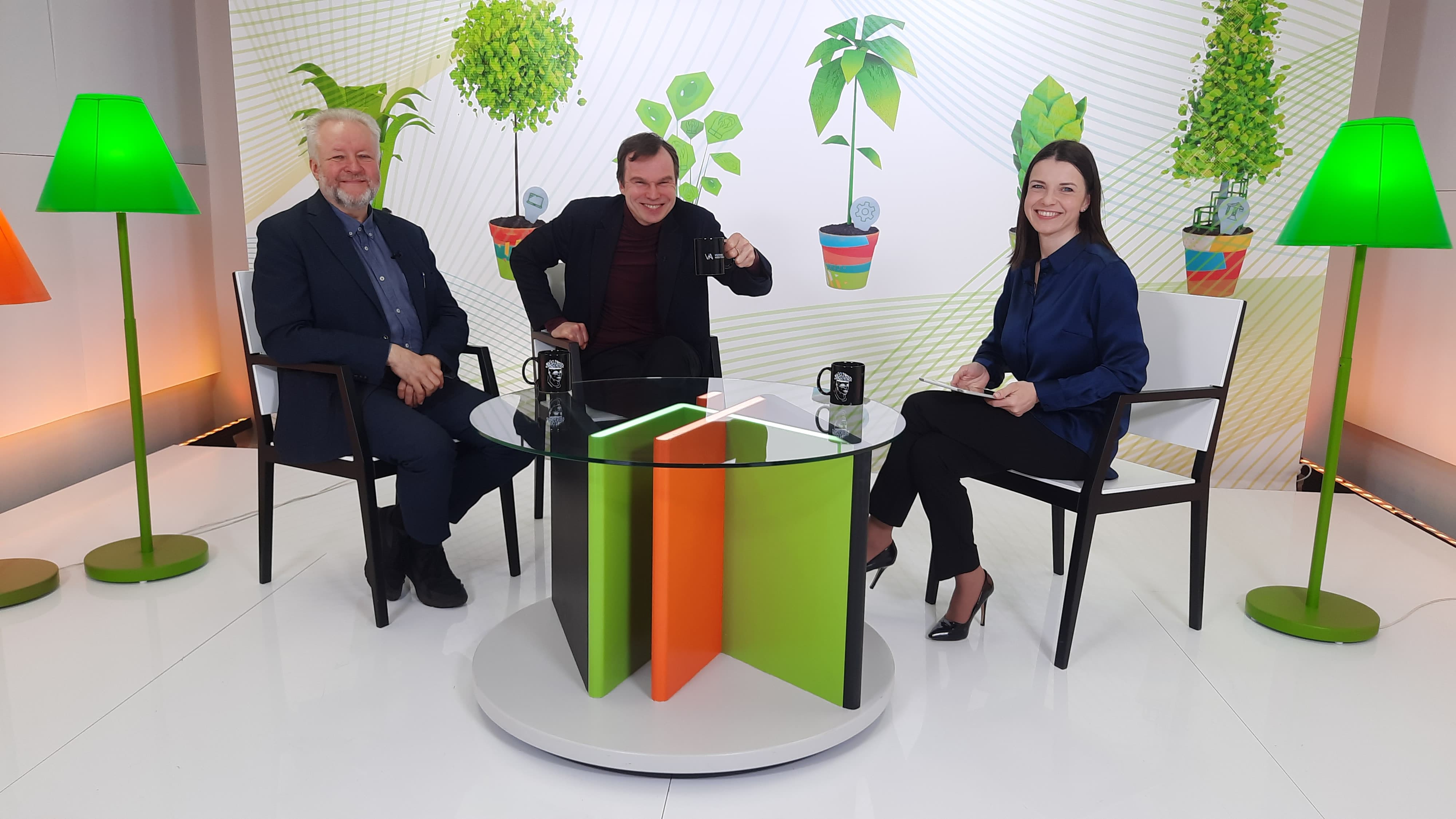ViA LABORATORIES
The Computer Network Laboratory provides for a possibility to carry out research related to various computer network technologies and computer network applications, and research requiring the particular hardware.
In the Computer Network Laboratory, students can apply their theoretical knowledge in practice. Students have the possibility to assemble and disassemble computers. It is possible to set up a small network, starting from the lowest level – cable pulling. During the network installation, students can use both local and global computer network technologies. Students have the possibility to work with equipment from world-renowned hardware manufacturers, including Cisco and Mikrotik.
the lowest level – cable pulling. During the network installation, students can use both local and global computer network technologies. Students have the possibility to work with equipment from world-renowned hardware manufacturers, including Cisco and Mikrotik.
In the Data Security Laboratory, students acquire practical skills in the field of cybersecurity, identifying and recognizing the signs of various types of malware such as worms, computer viruses, etc. in a virtual environment. In the laboratory, it is possible to install virtual machines for testing various operating systems. Data security servers can be used to test internal and external vulnerabilities. The Data Security Laboratory can be also accessed completely remotely. Students can set up a complete network, and, before completing the work, test and certify it using hardware specifically designed for this purpose.
Contacts:
Āris Aldiņš
[email protected]
Head of Computer Network Laboratory
Vidzeme University of Applied Sciences
Terbatas Street 10, Valmiera
Operational programme “Growth and Employment”, Priority Axis “Education, skills and lifelong learning”, 8.1.1 specific aid objective “To increase the number of modernized study programmes of STEM, including medicine and creative industries”, Project No. 8.1.1.0/17/I/003 “Modernization of Vidzeme University of Applied Sciences STEM study environment”
Operational programme “Growth and Employment”, Priority Axis “Research, technological development and innovation”, 1.1.1. specific aid objective “To increase the research and innovative capacity of scientific institutions of Latvia and the ability to attract external financing by investing in human resources and infrastructure”, Activity 1.1.1.4 “Development of the R&D infrastructure in fields of smart specialization and strengthening of institutional capacity of scientific institutions”, Project No. 1.1.1.4/17/I/005 “Development of scientific infrastructure of Vidzeme University of Applied Sciences to strengthen research and innovation capacity”.

The goal of the sub-direction “E-learning Management and Technology” of the research direction “Information Technologies” is to develop the architecture, engineering and technology, knowledge creation and transfer processes of e-learning solutions by using information and communication technology to create high-quality e-learning solutions that are always available in real time, at any place at the individual, organizational and community levels.
The activities of the E-learning Laboratory up to now, and the potential areas of work:
-
Functionality and extension of the e-learning system
-
Adaptation of the e-learning environment, support for the system users
-
WEB conference tool requirements and installation
-
E-course preparation methodology
-
Methodology of e-learning courses
-
Preparation of digital training materials and technological support
-
Technological solutions and the strategy for lifelong learning development
Contacts:
Sarma Cakula
Head of Media Laboratory: E-learning Management and Technology
Vidzeme University of Applied Sciences
Institute of Social, Economic and Humanities Research (HESPI)
Cēsu Street 4, Valmiera
E-mail: [email protected]
The goal of the Spatial Research Laboratory is to provide support for research within the economic sectors using geospatial data, with an emphasis on the tourism industry.
The key tool used is the Geographic Information System (GIS) that is widely used to visualize various data and processes. The GIS includes the storage, updating, analysis and visualization of geographic data and other thematic data (in the form of maps, charts, etc.).
The laboratory is equipped with the latest ARC GIS software enabling the use of innovative methods of geospatial data processing and analysis for research purposes.
One of the main products of the Spatial Research Laboratory is a unique geospatial database of Latvian tourism and recreation sector, which is regularly updated. Its content forms the basis for interpreting the analytical results of big data and business intelligence solutions. The thematically selected large data is derived from a variety of sources, including specially purchased or derived from equipment or sensors at the disposal of partners or laboratories. The result is used for sustainable development planning, forecasting tourism events, making reasoned decisions, justifying project applications or demonstrating the effectiveness of public spending investment.
The laboratory offers devices for the time, space and behaviour measurements of tourist mobility and the flow of public event visitors, devices for measuring various linear flows of tourists and visitors, devices for the spatial measurements of a short-term local visitor flow, software and know-how for data processing and various data combining, as well as for explaining correlations. It is possible to use tablets and GPS devices in field investigations and surveys.
The activities up to now, the potential areas of work, application:
- Social, economic and environmental impact of tourism and recreation activities
- Determining the effectiveness of tourism and marketing activities
- Measuring the time, space and behaviour of tourist mobility and the flow of public event visitors
- Development of strategic plans at the level of enterprise, site or destination development
- Identification of industry problem cases and finding solutions
- Measuring the socio-economic effects of tourism in specific regional areas
- Monitoring of visitor flows in specially protected nature areas
- Monitoring the sustainable development of tourism destinations in ~30 different thematic criteria groups
- Support for structured and thematically selected data
Contacts:

ViA VR-Lab has more than ten-year experience in design and development of virtual and augmented reality (VR/AR) systems for various sectors, including safety an industrial training, medicine and physiotherapy, tourism and cultural heritage, history and museums, marketing, education and other. As applied research laboratory VR-Lab develops VR/AR technological innovations related to edutainment, multiuser environments, simulation visualization, content management, evaluation scenarios, cloud-based rendering, digital twins, wearable sensors and artificial intelligence. Researchers of VR-Lab are involved in academic activities by developing and conducting course modules and courses for ViA IT master study programme "Virtual Reality and Smart Technologies".
VR-Lab team have led and participated in following projects (last 8 years):
- 2024. - 2025. 360 degree VR musical concert performances with special effects. LIAA voucher.
- 2024. - 2025. High-voltage substation task training. VR environment contract research for AS "Sadales tīkls".
- 2023. - 2026. Interreg BSR Interactive Gardens (#C036). Garden and park planting and simulation tool.
- 2022. – 2023. Building the digital capacity of higher education institutions through the integration of online learning resources and analytics intelligence (EduAim). Multiuser VR environment for collaboration and teambuilding. European Social Fond Project Nr. 8.2.3.0/22/A/003.
- 2022. – 2023. Automation tools for creative industries (AutoRade). Immersive technologies for creative industries. European Social Fond Project Nr. 8.2.3.0/22/A/004.
- 2022. – 2023. Digitization initiatives for the involvement of students and the improvement of the quality of studies at the University of Latvia and the higher education institutions of the project cooperation partners (Digiteka). Virtual reality environments for cybersecurity studies. European Social Fond Project Nr. 8.2.3.0/22/A/006
- 2022. - 2023. European Defence Industrial Development Programme (EDIDP) project Tactical Combat Casualty Care and Battlefield Advanced Trauma Life Support (EDIDP-SME-2020-045-VireTS).
- 2021. – 2022. Project "Virtual reality platform for safety training of construction workers", LIAA (KC-PI-2020/64).
- 2021. – 2023. Erasmus+ project Extended Reality in Biomedical Environments (REEB).
- 2021. Project "Real-time data visualization of bog hydrological regimes and simulations in virtual reality (BogSim-VR)", LZP (No. lzp-2020/2-0396).
- 2020. Project "Perspective Technologies for Sustainable and Safe Services" (ARTSS) of the National Research Program "Covid-19 Consequence Mitigation". Development of virtual reality content and integration of functionality in e-study platforms.
- 2017.-2019. State Education Development Agency post-doc project nr.1.1.1.2/VIAA/1/16/105 "Dynamic 3D visualization of the Internet of Things (IoT) elements in outdoor augmented reality (AR) modes".
Contacts:
Arnis Cīrulis
Head of Virtual and Augmented Reality Laboratory
Vidzeme University of Applied Sciences
Sociotechnical Systems Engineering Institute (SSII)
Tērbatas Street 10, Valmiera
E-mail: [email protected]
Operational programme “Growth and Employment”, Priority Axis “Education, skills and lifelong learning”, 8.1.1 specific aid objective “To increase the number of modernized study programmes of STEM, including medicine and creative industries”, Project No. 8.1.1.0/17/I/003 “Modernization of Vidzeme University of Applied Sciences STEM study environment”
Operational programme “Growth and Employment”, Priority Axis “Research, technological development and innovation”, 1.1.1. specific aid objective “To increase the research and innovative capacity of scientific institutions of Latvia and the ability to attract external financing by investing in human resources and infrastructure”, Activity 1.1.1.4 “Development of the R&D infrastructure in fields of smart specialization and strengthening of institutional capacity of scientific institutions”, Project No. 1.1.1.4/17/I/005 “Development of scientific infrastructure of Vidzeme University of Applied Sciences to strengthen research and innovation capacity”.

The Multimedia Laboratory is a structural unit of the Institute of Social, Economic and Humanities Research (HESPI) of Vidzeme University of Applied Sciences (ViA).
The Multimedia Laboratory has four areas of activity:
- to provide support to ViA researchers in promoting science communication, creating educational and informative audio/video materials about current research, scientific achievements, etc.;
- to provide support to ViA lecturers in improving the content of study courses, creating audiovisual materials in various formats;
- to provide support to ViA employees in promoting the visibility of the university by creating audiovisual materials in various formats;
- to provide ViA students with the opportunity (as part of study courses or internship) to gain initial experience in creating audiovisual content, experiment with new formats and participate in multimedia projects, which are afterwards published in the Latvian media environment, for example, on television, Internet platforms, etc.
The Multimedia Laboratory has a filming studio that can be easily transformed for creating various types of audiovisual content – for recording discussion programmes/talk shows and interviews, as well as for using a green screen and a lightboard.
The laboratory also has a computer classroom for editing audiovisual materials, a small sound recording studio, and equipment for recording various audio and video materials and is suitable for both filming thematic programmes and ensuring high-quality coverage of conferences, concerts and other events. The equipment is also suitable for creating documentaries and other types of large-format content. The equipment can also be used for media training.
So far, within the framework of study courses or internship, students, using technical resources available in the Multimedia Laboratory, have created a documentary film about mobbing “Dārta”, a documentary film about deportations “Three Sisters”, a talk show “A Stop at the Gauja”, a video to promote VUAS’s recognition, and other audiovisual works that have been posted on social media.
ViA in cooperation with the channel Re:TV, has also implemented a number of joint projects, the basis of which has been VUAS’s technical and professional resources, such as the documentary series “May 4: Could it have been otherwise?”, “The Baltic Road – the Road to Freedom”, “Nonviolent Resistance. 30th Anniversary of the Barricades”, “Restoration of Latvian Independence. The August Coup”, the programme series “Science at a Close-Up Focus”, “aNATOmy” and “Vidzeme Speaks. Openly”, the Saeima debate-expert studio, etc.
Contacts:

The Mobile Technology Laboratory has various types of smart devices, microcomputers, Internet of Things and wearable sensor kits available, which allow the development, testing and research of solutions related to mobile applications, remote data collection and biometric data collection and use.
The laboratory equipment is available to students, researchers and cooperation partners.
Contacts:
Arnis Cīrulis
Head of Virtual and Augmented Reality Laboratory
Vidzeme University of Applied Sciences
Sociotechnical Systems Engineering Institute (SSII)
Tērbatas Street 10, Valmiera
E-mail: [email protected]
Operational programme “Growth and Employment”, Priority Axis “Research, technological development and innovation”, 1.1.1. specific aid objective “To increase the research and innovative capacity of scientific institutions of Latvia and the ability to attract external financing by investing in human resources and infrastructure”, Activity 1.1.1.4 “Development of the R&D infrastructure in fields of smart specialization and strengthening of institutional capacity of scientific institutions”, Project No. 1.1.1.4/17/I/005 “Development of scientific infrastructure of Vidzeme University of Applied Sciences to strengthen research and innovation capacity”.

In the Mechatronics Training Laboratory there is a possibility to study the following topics related to the respective field:
- programming and application of programmable logic controllers (PLCs) in industrial process automation;
- process visualization and development of SCADA systems;
- learning the basics of electric machines;
- electric drive systems and drive automation;
- industrial robotic systems.
Contacts:
Operational programme “Growth and Employment”, Priority Axis “Education, skills and lifelong learning”, 8.1.1 specific aid objective “To increase the number of modernized study programmes of STEM, including medicine and creative industries”, Project No. 8.1.1.0/17/I/003 “Modernization of Vidzeme University of Applied Sciences STEM study environment”

In the laboratory, students and course participants learn:
basics of electrical engineering and understand the operation of electrical circuits;
basics and elements of analogue and digital electronics;
basics of power electronics;
development and debugging of electrical circuits;
electrical measurements;
programming and application of microcontrollers in process control.
Contacts:
Anna Skruode
Head of Electrical Engineering Laboratory
Vidzeme University of Applied Sciences
Tērbatas Street 10, Valmiera
E-mail: [email protected]
Operational programme “Growth and Employment”, Priority Axis “Education, skills and lifelong learning”, 8.1.1 specific aid objective “To increase the number of modernized study programmes of STEM, including medicine and creative industries”, Project No. 8.1.1.0/17/I/003 “Modernization of Vidzeme University of Applied Sciences STEM study environment”


